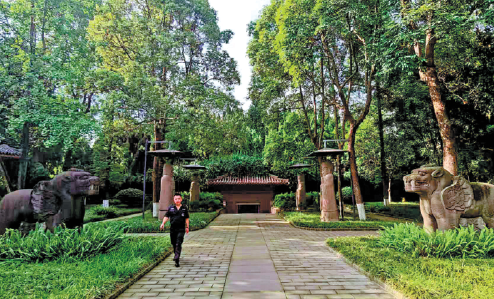Chengdu's best crypt secret
 0 Comment(s)
0 Comment(s) Print
Print E-mail China Daily, July 13, 2021
E-mail China Daily, July 13, 2021

Researchers believe that the relief sculptures provide valuable material in the study of several areas, including sculpture, music in the imperial court, organization of the imperial band and women's fashion during the Tang Dynasty.
Seven years after he passed away, Wang Yan, Wang Jian's 11th and youngest son, ascended to the throne at 18 and was very corrupt, caring for only women and wine.
The kingdom was eventually toppled by the Latter Tang Kingdom (923-936), the capital of which was Luoyang, Henan province.
"About 20 years after the demise of his kingdom, Wang Jian's mausoleum was sacked," says Feng Xia, deputy curator of Yongling Museum.
Even so, about 400 relics including silver, jade, copper, iron and earthenware were excavated. Many of them are on display in a modern, three-story building at the north end of Wang Jian's Tomb.
Relics from the relatively short-lived Five Dynasties and Ten Kingdoms period are seldom uncovered. This makes the treasure found in Chengdu important for studying the period.
The most valuable pieces are a jade seal and a jade girdle.
The seal, 11.7 centimeters by 10.7 centimeters by 3.4 centimeters, is one of only two seals for the "nether world" to have been discovered in the mausoleum of an emperor. The other seal was found in the mausoleum of Emperor Wanli of the Ming Dynasty (1368-1644).
The seal has a dragon's body and a rabbit's head. The dragon was the symbol of an emperor in ancient China, while Wang Jian was born in the Year of the Rabbit according to the Chinese zodiac.
Made of seven pieces of jade, the girdle was Wang Jian's favorite.
Legend has it that, three years before Wang Jian's death, a fire destroyed his palace. The next day, the only thing Wang found in the ashes was a large piece of jade of incomparably high quality.
As jade was believed to burn easily, Wang, who was very superstitious, thought that the piece must have been offered to him as a gift from heaven. He had craftsmen make a girdle with the jade and he wore it every day.
Technically, he still does-it is carved into his seated stone likeness in the coffin chamber.






Go to Forum >>0 Comment(s)